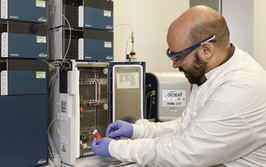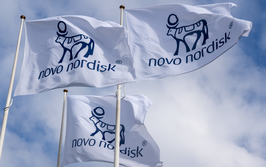“I was so tickled when we hired Mark; he is a blessing for Rx-360 and he is a full-time leader. It’s no longer myself or Brian Johnson or Lynn Byers running Rx-360 as a side job – Mark is only dedicated to Rx-360. He has a wealth of experience from the FDA and the pharma industry, and brings the unique skillset of a lawyer. He’s done some fantastic work with regulators, the World Health Organization, charities, and making in-roads into China. And I have high expectations that he will continue do great things. Mark really believes in the driving mission of Rx-360 – and you have to believe for others to follow you.”– Martin van Trieste

The Goals of Rx-360
- Developing voluntary standards for the quality and authenticity of supplies and suppliers.
- Developing and implementing audit standards and auditor training and certification regarding the quality and authenticity of supplies and suppliers.
- Joint development of technologies to enhance the quality and authenticity of supplies.
- Developing and implementing a method for exchanging, between members, public information regarding the quality and authenticity of supplies and suppliers and non-public information regarding the quality and authenticity of supplies and suppliers that could adversely impact patient health or welfare.
- Adoption of a seal for use by members that meet the consortium’s standards.
Rx-360 was initially set up with a large law firm, Drinker Biddle and Reath LLP, serving as the administrative function for the organization. As Rx-360 started grow, it became clear that it needed to migrate to a more traditional business model, which led to the search for a CEO. Ultimately, Mark Paxton was chosen for the role in October 2015.
You started out as a lawyer….
Right. I was based in Lexington, Kentucky, and one of my clients was a small pharma manu-facturer called Murty Pharmaceuticals that did a lot of work for the National Institutes of Health. I ended up working for them full time. It was a small company – there were around eighteen employees at the time – and the company president, Ram Murty, was widely recog-nized as a GMP expert. I had the luxury of being able to learn the pharma business inside and out. Working in a small company environment has many advantages because you get to wear multiple hats. I was director of legal and regulatory affairs, but I had the opportunity to spend time in manufacturing suites and the QC lab. Consequently, I can read an HPLC chromato-gram (not bad for a lawyer, right?), developed SOPs, and most importantly, was given the time to read virtually everything that the FDA had published as regulations or guidances cov-ering GMPs and application approvals.
How did you become interested in the supply chain?
Somewhere along the way, PhRMA got in contact with me via a headhunter. I remember thinking at the time, “Why would you be even remotely interested in me?” It happened though, and I learned so much at PhRMA – I worked with almost every major regulatory au-thority in the world. And during my last year and a half there, I was tasked with examining some of the issues regarding track and trace, and serialization, and it got me looking at down-stream distribution channels. I was really excited about that. It’s one thing to work on the ap-proval process and drug development, but once you get into distribution it involves a differ-ent type of complexity all the way around – products go to distributors and end up every-where. You start thinking about the kinds of controls you can put into place once the product is introduced into national or international commerce to assure the product is not improperly diverted. This has proven to be a really difficult challenge and it’s an area ripe for regulatory oversight. In the US and many other countries, there are festering opportunities for diversion to occur – and it’s something we’ve seen far too many times already. Participating in solu-tions for these issues directly impacts patients, which is why I am pretty passionate about supply chain security.
The issue was also squarely on the agenda of the FDA Center for Drug Evaluation and Re-search, where I eventually had the opportunity to work. I really enjoyed my time there and cannot emphasize enough what a wonderful place the agency is. There, I focused on a large, externally-funded program through the Asia Pacific Economics Cooperation (APEC), which is a multilateral government-to-government program that aims to promote trade. I was asked to lead something called the “Road Map to Promote Global Medical Quality and Supply Chain Security”. The aim was to develop a holistic view of the movement of starting materi-als from manufacturing through distribution – and ultimately to dispensing. We were evaluat-ing numerous gaps in supply chains that led to patient exposure to adulterated, counterfeit and diverted drugs.
How did you hear about Rx-360?
I knew Martin Van Trieste peripherally through his links to PhRMA and I’d heard about the creation of Rx-360, but I hadn’t worked directly with him until I got involved with APEC. At the FDA, I had to bring many regulatory authorities and industry constituents to the table – and Rx-360 was the primary mechanism for access to supply chain experts from industry. The roadmap is now close to fruition and it was a wonderful way to be exposed to Rx-360.
When I found out that Rx-360 was interested in changing their business model, I threw my hat into the ring for the role of CEO. The attraction for me was the opportunity to operate in a smaller, nimbler organization with which I shared core values regarding patients; and one which was willing to selflessly offer up best practices to close some of the gaps in the global supply chains that are increasingly being adopted by stakeholders. While at FDA, much of my work centered around policy making, and the problem with looking at problems with the policy lens is that it takes time.
Consequently, I was thrilled when I was selected for the role!
What was your main focus in your first year as CEO?
The year 2016 was all about getting organized and transitioning to the new structure. When it comes to running an organization, there is a lot of complexity in terms of processes and pro-cedures. I was hired as a CEO but when I joined, we’d never had an accounting function – we’d never needed one since all the membership fees went to the former secretariat. Fortunately, I am an economist so I understand accounting principles, and the need for appropriate financial controls.
Similarly, all of our document management and online collaboration tools resided in the for-mer secretariat’s servers so we had to build the infrastructure ourselves using cloud-based systems. Most importantly, I also had to replace the very significant man-hours that the for-mer secretariat had been putting in while supporting Rx-360. In a lot of ways it was like a start-up company. The transition seems to have gone well though. When we surveyed our members, they said that the transition seamless.
What’s on the cards for the joint audit program?
The joint audit program is a significant part of the value Rx-360 has brought to both members and non-members. As noted by Martin, the heparin tragedy highlighted the fact that our in-dustry does not always have full clarity about what is happening upstream at the immediate supplier level, and especially, multiple tiers above them. Since heparin, Rx-360 and its mem-bers have done some phenomenal work to help change this. What Martin and other board members have achieved in making Rx-360 an advocate for patient safety, while still having to pay attention to their individual jobs and commitments to their organizations, is nothing short of incredible.
Going back to the joint audit program, it has two primary objectives. One is to lower the un-sustainable number of audit requests that are being made to any given supplier. Imagine a supplier with 150 customers receiving audit requests from each of them – it’s impossible to do. Our second objective is to lower the average costs for manufacturers who are required, as part of their vendor qualification programs, to perform those audits.
Readers should know that every now and then I come across somebody who was involved in the joint audit program early on – and sometimes I hear something derogatory about the pro-cess and the program, but I am very quick to realize that they are talking about the way the program operated early on. Whenever you pioneer something, you cannot possibly anticipate everything – and there is nothing shameful about learning as you go along. Today, we are much different. We have a validated database where all the audit reports, auditors’ qualifica-tions, Scope of Work statements, and confidentiality agreements for every party are uploaded and accessible whenever an audit is scheduled or performed. One of the other changes we made to the program was to enter into a sole source contract with the British Standards Insti-tute, which has a global auditing footprint. These changes have led to a far more automated and efficient process. While we are still optimizing, the processes and procedures today are far richer and more robust than they were before.
What else are you planning for Rx-360?
Although our member companies have been very strong in spreading the word about Rx-360’s activities, we need to create greater global awareness of the organization and the work that we do.
To that end, our Board and I have highlighted three main focus areas for 2017 that align with our long term strategic plan:
- Improving the speed and efficiency of the Audit Program.
- Addressing the highest risk supply chain threat areas through sharing of best practices amongst industry and regulatory authorities, including development of enhanced training programs.
- Developing and expressing greater use of external communications platforms for both members and non-members.
In addition to continuing our focus on our very strong manufacturer and supplier base, I be-lieve that we also need to develop inclusive relationships with healthcare systems and phar-macies – after all, they are the biggest purchasers of the biopharma and medical device indus-tries’ products supplied by Rx-360 members. Collectively, we need to better understand how these organizations handle medical products and in turn, these organizations need to better understand all the quality principles that go into the manufacture and distribution of these products for the benefit of our patients. Several years ago, stolen insulin ended up being sold in a large, chain pharmacy. How did it end up there? There is a clear issue here and we need to make sure that all stakeholders understand how drugs are supposed to be distributed, not just how they are manufactured.
Finally, Rx360 needs to build on its past success by continuing to fill the niche of being the one volunteer-led consortium that looks at product integrity across the end-to-end supply chain in order to protect patients. With more than 60 current member companies and a large number of official observers, we have more than 300 volunteers engaged across more than 20 working groups addressing issues that cut across all upstream and downstream nodes of the supply chain. For this reason, all of us truly believe that we are an industry group like no other while setting a standard for trade associations in the 21st Century.
Mark Paxton is CEO of Rx-360, a supply chain consortium.



















